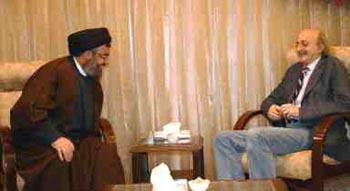Junblatt exposes Hezbollah’s convoluted stance on presidential elections
Nasrallah on Friday claimed to back Aoun but also refused to reject Franjieh’s nomination
Joseph A. Kechichian/Gulf News/January 30, 2016
Beirut: Lebanese Druze leader Walid Junblatt on Saturday reacted to Hezbollah chief’s speech on Friday night where he praised Iranian democracy and rejected any claims that it was behind Lebanon’s over two-year presidential deadlock.
“Iran has stressed that the presidential issue is a domestic affair and that it would support what the Lebanese would agree on.”
“As for the issue of Iranian democracy, Iran has organised more than 35 elections in the past 37 years and the polls were never suspended, despite the wars and bombing. But we in Lebanon are searching for any excuse to postpone the elections and we don’t have a constitutional authority to address the differences,” he noted.
Nasrallah also claimed his party was “ethically and politically committed” to the nomination of Free Patriotic Movement leader Michel Aoun for presidency.
Inasmuch as these sharp exchanges highlighted, it was increasingly clear that Lebanese officials were not amused by Hezbollah’s theatrics, and refused to tolerate even the notion that Lebanese democracy—despite its shortcomings—could be or ought to be compared with the Iranian version.
For the Hezbollah leader, Aoun’s presidential nomination was a foregone conclusion, though somewhat camouflaged in convoluted prose that raised eyebrows.
“If we can guarantee that Aoun will be elected president tomorrow,” concluded Nasrallah, “we would go to parliament and take part in the elections and we would not demand a package settlement, a constituent assembly or constitutional amendments.”
This was a revelation in and of itself since it telegraphed that Hezbollah was not ready to pressure the other March 8 tenor, Marada Movement leader Sulaiman Franjieh, to withdraw, again, for “ethical reasons”. In reality, Nasrallah toyed with both contenders, and even welcomed the presence of Henri Helou, the third candidate nominated by the Progressive Socialist Party’s Walid Junblatt, which meant than none of the three could get the required 65 votes. Worse, Nasrallah criticized Franjieh, who is backed by former Prime Minister Saad Hariri and his moribund March 14 alliance.
Observers believe Iran, through its Hezbollah proxy Iran, has no interest in the Lebanese parliament to elect a president. In a surprise move, Lebanese Forces leader Samir Geagea, who was the official March 14 movement’s candidate that opposed Aoun, through his backing of his rival on January 18. As Aoun was the official candidate nominated by the March 8 movement, which Hezbollah leads, the move put pressure on the Iranian proxy group to let the elections occur without any hold up.
“If Iran was indeed not hindering the elections, as you are claiming,” Junblatt wrote in his weekly editorial in the Progressive Socialist Party-affiliated Al Anba’a website, “then any citizen has the right to ask what are the real reasons for the lack of quorum at electoral sessions?”
Junblatt reiterated that the vast majority of Lebanese did not want Lebanese democracy “to transform into the Iranian one” as he rejected Nasrallah’s praise of Iran’s election track record.
Lebanon, wrote Junblatt, did not operate on the premise “that the results of [any] election [ought to] be guaranteed in advance before ensuring quorum.”






















